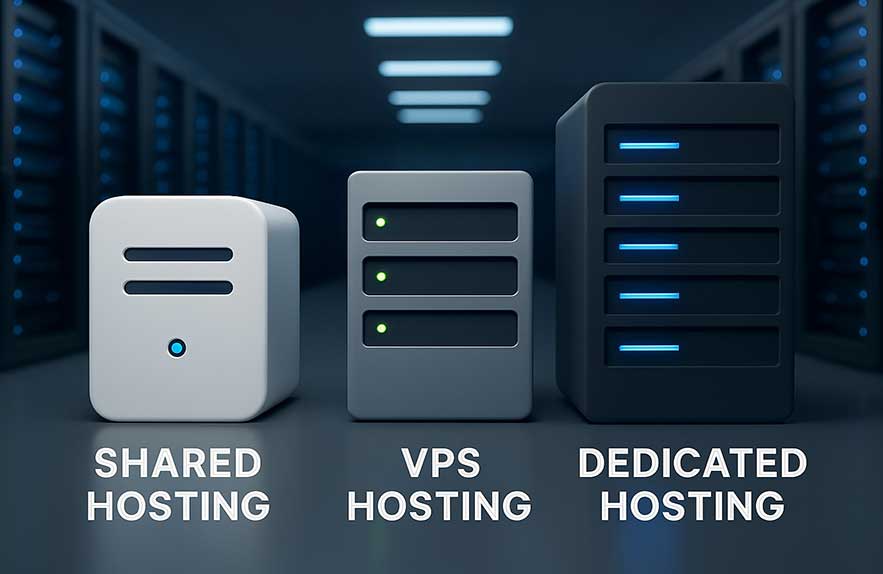
What Are Shared, VPS, and Dedicated Hosting?
Shared vs VPS vs dedicated hosting—if you’ve been comparing web hosting plans for even a few minutes, you’ve probably seen these terms all over the place. But what do they actually mean, and why does it matter for your website? These are the three most common types of hosting options, and understanding their key differences will help you make a smart decision from the very start.
Let’s break down shared hosting vs VPS and dedicated hosting in plain English. Web hosting just means renting space on a special computer (a server) that keeps your website online 24/7. The way that server’s resources are divided—how many people share it, how much you can customize it, and how much it costs each month—defines which type of hosting you’re signing up for. Each option offers a balance of price, control, and performance.
The simplest option, shared hosting, is like sharing an apartment with roommates. You all pitch in for rent, so it’s affordable, but you also split things like the kitchen and bathroom—which in hosting terms means bandwidth and processing power. VPS hosting is a step up: imagine a condo, where you have your own apartment space and more privacy, but still share the overall building. Dedicated hosting is like having the whole building to yourself—every room, every resource is yours and only yours. When comparing shared vs VPS vs dedicated hosting, it comes down to the level of control, price, and power you need for your project.
It’s totally normal to feel lost at first with these choices. Most people just starting a website begin with shared hosting, but as sites grow and traffic increases, switching to VPS or even dedicated hosting is common. To see more comparisons and visual breakdowns, check out SiteGround’s hosting guide or browse Cloudflare’s dedicated hosting glossary for straightforward, tech-free explanations.
In the next few sections, we’ll take a closer look at what makes each type of hosting unique—and how to know which option is the best fit for your website’s needs and your budget. No jargon, no confusion—just a clear path to finding the right hosting setup for your goals.
Table of Contents
- What Are Shared, VPS, and Dedicated Hosting?
- Shared vs VPS vs Dedicated Hosting: How Shared Hosting Works (Pros & Cons)
- Shared vs VPS vs Dedicated Hosting: How VPS Hosting Works (Pros & Cons)
- Shared vs VPS vs Dedicated Hosting: What to Expect with Dedicated Hosting
- Shared vs VPS vs Dedicated Hosting: Performance, Cost, and Control Compared
- Shared vs VPS vs Dedicated Hosting: Performance, Cost, and Control Compared
Shared vs VPS vs Dedicated Hosting: How Shared Hosting Works (Pros & Cons)
Let’s get honest about this: when most people start shopping for web hosting, they don’t even know there’s such a thing as shared vs VPS vs dedicated hosting. I sure didn’t, back when I spun up my first blog. Honestly, the words all blended together until I needed to pick! So let’s talk real life. Shared hosting is just the most “no drama, no fuss” way to put a website online. It’s dirt cheap, requires almost zero tech know-how, and most folks (myself included a few years ago) just wanted a site without paying out the nose every month or learning server magic.
Picture this: you’re in your first apartment with a few roommates. You get your own room (your website), but you’re all using the same fridge, shower, and WiFi (the server and its resources). That’s shared hosting in a nutshell. It’s great until one of your roommates invites all their friends for a weekend party—suddenly, the internet slows to a crawl and there’s no hot water (that’s what happens when a “neighbor” gets a traffic spike or uses too much bandwidth). Shared hosting vs VPS vs dedicated hosting is really about how much of the “house” you get to yourself, and how much you need to share.
Here’s what’s cool: with shared hosting, companies handle all the behind-the-scenes tech stuff. You don’t mess with server security, backups, or any of the IT headaches—I appreciate that a lot. Beginners and people starting side gigs (think: photographers, hobbyists, shop owners, small charities) won’t even notice the “limits” for a long while. Setup is straightforward; you pick a name, click a couple of buttons, and have your website running by lunchtime.
What about the downsides? Like I said, if someone else has a crazy traffic day, your site might slow down. If you notice longer load times during your big sale or after a shoutout on social, that’s a classic “shared vs VPS vs dedicated hosting” wake-up call. At some point—as your website or store actually gets busier—you’ll want more privacy, speed, and control, which is when VPS or dedicated hosting makes a lot more sense. If you want to see a relaxed, plain-English breakdown, I recommend WPBeginner’s real-world shared hosting explanation. They don’t talk down to you; they just explain what regular people actually experience.
Bottom line? Shared hosting is like training wheels for your online project. If you’re learning, experimenting, or don’t expect wild traffic, it makes total sense. And nobody will judge you for “upgrading” later—literally everyone I know started here. In this whole shared vs VPS vs dedicated hosting universe, shared hosting is where almost everyone begins the journey.
Shared vs VPS vs Dedicated Hosting: How VPS Hosting Works (Pros & Cons)
After spending some time with shared hosting, plenty of site owners eventually hit a ceiling—they want faster load times, better security, or maybe just room to tinker. That’s where VPS hosting enters the chat in the whole shared vs vps vs dedicated hosting showdown. I remember the day my first little site finally outgrew its beginner bedroom, and suddenly all those “VPS vs dedicated hosting” reviews made a lot more sense.
So, what’s the deal with VPS hosting? Think back to our apartment analogy. Now, imagine moving from a shared flat to your own condo in a building. Sure, there are still other condos (other sites) in the building, but you have your own locks, your own bathroom, and probably even a little more freedom to redecorate however you like. In hosting terms, a VPS (Virtual Private Server) gives your website its own segment of the server’s resources, cut off from the other “tenants” for better performance and privacy.
This setup quickly becomes the sweet spot for growing projects and people with a bit of technical curiosity. You’re still not paying the big bucks for an entire server (that’s what dedicated is for), but you’re no longer stuck with every restriction of shared hosting. VPS hosting is especially useful for developers, small business owners, e-commerce sites, and anyone running custom apps. You get more control—often with root access, meaning you can install special software or tweak security just the way you want. For folks who want to dig even deeper, the DigitalOcean VPS explainer is a genuinely clear resource.
But let’s be real: VPS hosting isn’t all rainbows. It comes with more responsibility. Sometimes you’ll need to manage simple maintenance, install updates, or troubleshoot (although most good hosts now offer “managed” VPS, so you don’t need to be a full-blown sysadmin). It’s pricier than shared, but the payoff is in speed and reliability—plus, you won’t find your site crawling just because another user got lucky and went viral.
Of course, for super high-traffic sites or mission-critical apps, VPS might eventually feel cramped. That’s where “VPS vs dedicated hosting” becomes a real debate: do you want your own virtual room, or do you need the whole building? But for my money—and for a huge chunk of small businesses and tinkerers—VPS is the clear upgrade once shared hosting feels limiting. In the next round, we’ll see what dedicated hosting looks like and who actually needs that much power.
Shared vs VPS vs Dedicated Hosting: What to Expect with Dedicated Hosting
So, you’ve heard about shared hosting and VPS hosting, but what if you need ultimate control and performance? That’s where dedicated hosting steps into the spotlight in the shared vs vps vs dedicated hosting discussion. This is the option for people who want a whole server to themselves. No neighbors, no sharing, no compromises—just your website and all the resources the server can offer.
If VPS was like having your own condo, dedicated hosting is like buying the entire house. You don’t have to worry about someone else slowing down your connection or hogging bandwidth. The only thing that matters is how you set up your site and how much traffic you get. For businesses running large ecommerce sites, agencies with lots of client traffic, or anyone managing mission-critical projects, dedicated hosting is the go-to answer in the shared vs dedicated hosting debate.
There are clear upsides. You get as much power and storage as you need, the best possible uptime, and full access to tweak server settings to your liking. It’s ideal for people with advanced technical skills or companies that have a tech team handling security and upgrades. In fact, for companies handling sensitive data, dedicated hosting is almost always a requirement. Curious about the true differences? The comparison by HostGator gives a straightforward overview with plenty of examples.
Of course, there are reasons not everyone jumps straight to this level. Dedicated hosting costs significantly more than VPS or shared hosting, and generally requires more hands-on administration—configuring backups, updates, and some security tasks yourself. If “vps vs dedicated hosting” is your current question, it probably means your website is already busy or you expect fast growth. Otherwise, most beginners can safely skip dedicated hosting until their needs demand it.
Ultimately, deciding between shared vs dedicated hosting is all about your goals, your budget, and your tolerance for tech. If you are running a small project, dedicated resources are probably overkill. But if you want top speed, reliability, and total control, it might soon be worth the step up. Next, let’s put all three types head-to-head so you can clearly see how they stack up.
Shared vs VPS vs Dedicated Hosting: Performance, Cost, and Control Compared
Choosing between shared vs vps vs dedicated hosting really comes down to what matters most for your website. Each type provides different levels of speed, flexibility, and price, so making sense of their differences helps you match hosting to your real needs. Let’s break down the big factors side by side.
Performance: Shared hosting gives you basic speed, enough for blogs and low-traffic sites, but you may notice things slow down if a neighbor gets busy. VPS hosting offers more stable and predictable performance because you get your own slice of the server’s resources. Dedicated hosting delivers top speeds and handles heavy traffic without breaking a sweat since every resource is yours. For a look at real-world performance numbers, the uptime and speed charts over at Pingdom and GTmetrix are helpful tools worth bookmarking.
Cost: Shared hosting is by far the cheapest, often less than a cup of coffee each month. VPS hosting costs more but gives you a noticeable jump in power and control. Dedicated hosting is a bigger investment and usually reserved for serious business sites or online stores that demand high capacity and reliability.
Control: With shared hosting, you get a simple dashboard and not much else. VPS gives you root access or the option to tweak more settings. Dedicated hosting puts you entirely in the driver’s seat—you can customize everything from the operating system to server security. If being hands-on matters to you, this could be a key decision point, especially in the vps vs dedicated hosting debate.
Comparison Table:
| Type | Performance | Cost | Control | Best For |
|---|---|---|---|---|
| Shared Hosting | Basic | Low | Minimal | Beginners, blogs, small sites |
| VPS Hosting | Good | Medium | Moderate to High | Growing businesses, tech users |
| Dedicated Hosting | Excellent | High | Complete | Large or high-traffic sites, enterprise, agencies |
There is no one-size-fits-all hosting. Shared hosting is easy and affordable, VPS is for sites that need more room to grow, and dedicated hosting is for those who want the best and are ready to manage more themselves. Everything in this shared vs vps vs dedicated hosting comparison comes down to the stage your project is in and how far you want to go.
Shared vs VPS vs Dedicated Hosting: Performance, Cost, and Control Compared
Choosing between shared vs vps vs dedicated hosting really comes down to what matters most for your website. Each type provides different levels of speed, flexibility, and price, so making sense of their differences helps you match hosting to your real needs. Let’s break down the big factors side by side.
Performance: Shared hosting gives you basic speed, enough for blogs and low-traffic sites, but you may notice things slow down if a neighbor gets busy. VPS hosting offers more stable and predictable performance because you get your own slice of the server’s resources. Dedicated hosting delivers top speeds and handles heavy traffic without breaking a sweat since every resource is yours. For a look at real-world performance numbers, the uptime and speed charts over at Pingdom and GTmetrix are helpful tools worth bookmarking.
Cost: Shared hosting is by far the cheapest, often less than a cup of coffee each month. VPS hosting costs more but gives you a noticeable jump in power and control. Dedicated hosting is a bigger investment and usually reserved for serious business sites or online stores that demand high capacity and reliability.
Control: With shared hosting, you get a simple dashboard and not much else. VPS gives you root access or the option to tweak more settings. Dedicated hosting puts you entirely in the driver’s seat—you can customize everything from the operating system to server security. If being hands-on matters to you, this could be a key decision point, especially in the vps vs dedicated hosting debate.
Comparison Table:
| Type | Performance | Cost | Control | Best For |
|---|---|---|---|---|
| Shared Hosting | Basic | Low | Minimal | Beginners, blogs, small sites |
| VPS Hosting | Good | Medium | Moderate to High | Growing businesses, tech users |
| Dedicated Hosting | Excellent | High | Complete | Large or high-traffic sites, enterprise, agencies |
There is no one-size-fits-all hosting. Shared hosting is easy and affordable, VPS is for sites that need more room to grow, and dedicated hosting is for those who want the best and are ready to manage more themselves. Everything in this shared vs vps vs dedicated hosting comparison comes down to the stage your project is in and how far you want to go.

